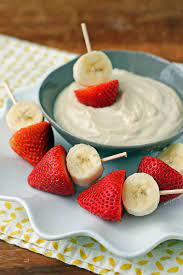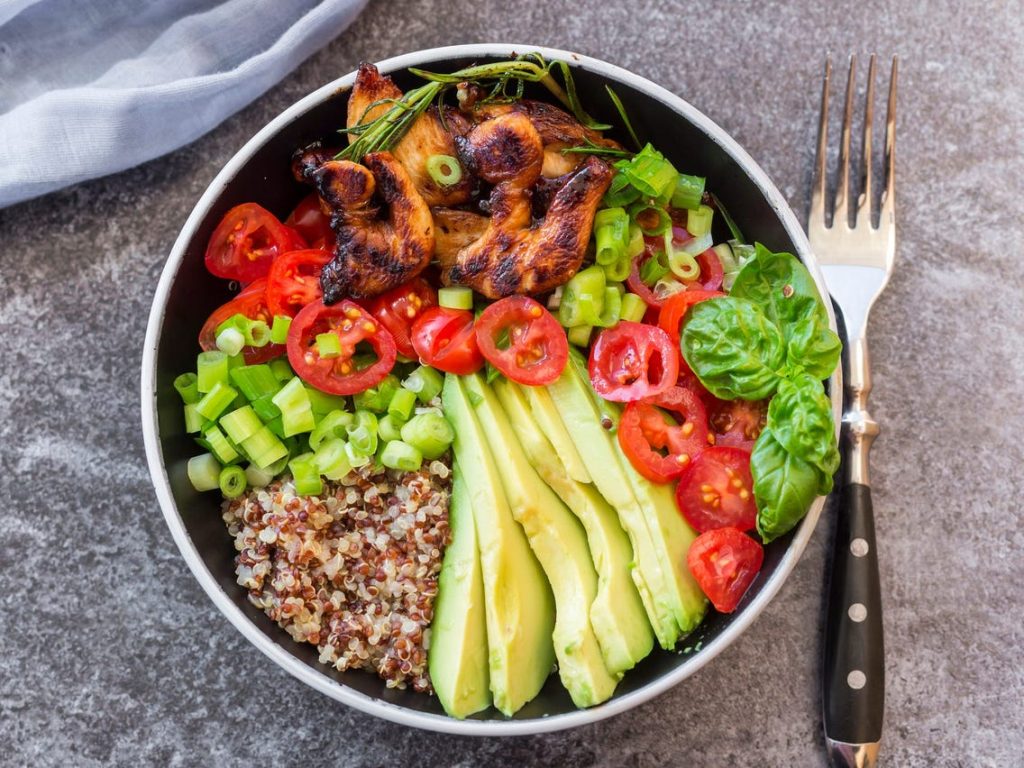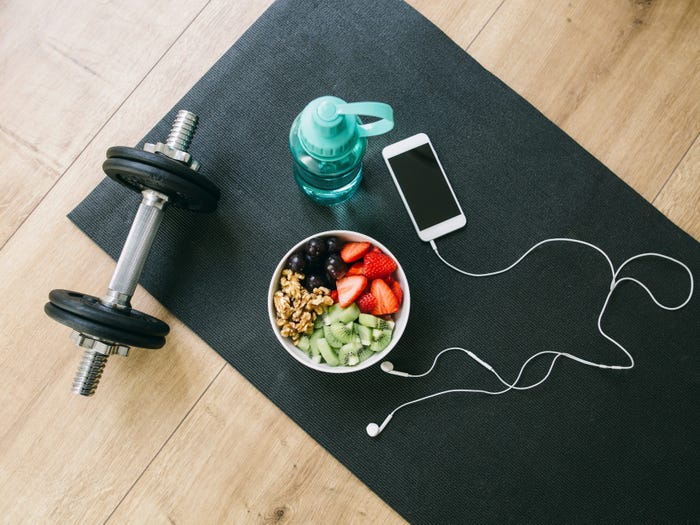When and what you eat after your workout has a direct impact on how you recover from your workout. Proper refueling post-workout means you give your body what it needs to replenish what it used so you can work out strong the next time. The objective of post-workout nutrition is to refuel, repair and rehydrate. During exercise the body uses stored energy from our muscles, muscles are broken down and damaged, and fluid is lost through sweat. Therefore, by providing the body with the appropriate nutrients post-workout can help to restore balance and optimize recovery. Consuming protein, carbohydrates and fluids can help the body to adequately refuel, repair and rehydrate.
Carbohydrates to Refuel
Carbohydrates are the body’s main source of energy. They are stored in our muscles and liver as glycogen. During exercise, glycogen is use as fuel and our stores are depleted. The more intense the activity the more glycogen gets used. Eating carbohydrates post-workout helps replenish stored glycogen and start the recovery process. Consuming carbohydrates post-workout is especially important for endurance athletes or athletes who are training for several hours or multiple times per day.
Examples of carbohydrates: Fruit, oats, bread, crackers, rice, granola and potatoes
Protein for Repair
Eating protein post-workout helps to repair and rebuild muscle. Exercise causes the breakdown of muscle, although the exact level will vary from one form of exercise to another. Eating protein post-workout helps stimulate the muscle to repair itself. An individual’s exact protein requirements will vary depending on the form of exercise and type of athlete. Eating 15 to 25 grams of protein post-work is a good guideline to follow. Consuming adequate protein post-workout is especially important for strength athletes or individuals who partake in strength and resistance training. Just be sure to include the carbohydrates and fluid too!
Examples of protein foods: Eggs, yogurt, cottage cheese, nuts, poultry, seafood, meat and protein powder
Fluids to Rehydrate
Drinking water or hydration drinks post-workout helps to replenish the body with fluids lost through sweat during exercise. Calculating the exact amount of fluid necessary is especially important for endurance athletes or individuals training in high-temperature climates. For the average person going to the gym, it is best to focus on consuming water post-workout, as well as before and during. You can get fluids from water, as well as hydrating fruits and vegetables.
When and what to eat post-workout
When to eat and how much to eat depends on the type and intensity of activity you are doing, and when you last ate a meal. The longer you go and the higher the intensity, the sooner you will want to eat something. Likewise, if it has been a while since you last meal or snack, you will also want to eat sooner.
A note on exercise intensity. How intense your exercise is dependent upon each individual; how old they are and how fit they are. Someone who has not previously been working out will feel a higher intensity level for the same exercise that someone who is more fit would say is a lower intensity level. Intensity can be measured by your heart rate, and it can also be measured by how you feel. The reason why intensity makes a difference when we are talking about refueling, is because the higher the intensity, the more carbohydrates your body will use. Carbohydrates provide a quick fuel source, so when exercise is more intense your body needs fuel to get there fast, thus it uses more carbohydrates. See the table below for general breakdown of each exercise intensity level.
| Level of intensity | How hard it feels to you | Physical cues | % of Maximum heart rate* |
| Low | Easy | Does not induce sweating unless it’s a hot, humid day. There is no noticeable change in breathing patterns. Can talk normally. | 40-50% |
| Moderate | Somewhat hard | Will break a sweat after performing the activity for about 10 minutes. Breathing becomes deeper and more frequent. You can carry on a conversation but not sing. | 50-70% |
| High | Hard | Will break a sweat after 3-5 minutes. Breathing is deep and rapid. You can only talk in short phrases, if at all | 70-85% |
*Maximum heart rate is calculated by subtracting your age from 220. For more information click here
If your exercise is low intensity, and less than an hour, and you eat your meals and snacks regularly, you don’t need to worry too much about doing anything special to refill your glycogen stores because you likely didn’t use them all up. Eat whenever you normally would for your next meal or snack. Make sure that is a balanced meal that includes carbs, protein, healthy fat and vegetables. If you didn’t eat before your workout (for example, a morning workout) or if you feel hungry after your work out, it’s a good idea to eat a post-workout snack.
If your exercise is low intensity, and more than 90 minutes; OR If your exercise is medium to high intensity and lasting more than 30 minutes, you want to think about how you refill your glycogen stores. If you didn’t eat a balance meal within the 2-3 hours prior to working out, or your next meal won’t be in the next two hours, then you will want to eat a post-workout snack to refill those glycogen stores and give your body some energy to use to get you to your next meal. If you are hungry or feeling fatigued after your workout, or notice you got tired during your workout, then you will also want to eat a snack. Those are all signs that your body needs more fuel. If none of those apply to you, then you can just wait to your next meal to eat. Make sure your meal is a balanced meal that includes carbs, protein, healthy fat and vegetables.
If your exercise is medium to high intensity and lasting more than 60 minutes, a post workout snack will be beneficial. Try to eat it within a half hour of finishing. Your muscles and liver will be low on glycogen by this point and the snack will help boost energy and allow your body to start working on recovery. You will also want to eat your next meal in the next 2 hours after finishing. If you noticed that you are more sore, more fatigued, or no longer getting strength gains, it likely means you are not eating enough pre- and/or post-workout.
Post workout snack ideas:
Your post-workout out snack should be mostly carbohydrates and include some protein. Carbohydrates to refuel and protein to repair. Make sure to drink some water too!

- Greek yogurt and granola
- Cottage cheese and fruit
- Tuna and crackers
- Hummus and pita
- Milk and oatmeal
- Peanut butter and apple or banana
- Deli meat and wrap
- Protein granola bar
- Fruit and nuts
- Eggs and toast
Post workout meal ideas:
Your post-work out meal should be balanced and include carbohydrates, protein, healthy fat and vegetables. Don’t forget the fluid too!

- Chili with bread or tortilla chips
- Chicken, rice and vegetables
- Taco bowls with chicken or shrimp, rice, beans, corn, tomatoes, avocado and cheese
- Salmon, sweet potato and broccoli
- Egg and veggie omelet with toast
- Stir fry with protein and veggies over rice
- Soup, bread and salad
If you want help planning out meals and snacks to maximize your training, I can help you find a plan that works for you! I have personal experience with eating to support athletic and fitness goals and I have also helped others create plans to support their training and goals. Together we can find the best plan that works for you! Feel free to email me with questions or to set up an appointment. lrobinson (at) clubworx.net
Stay healthy!
Lisa Robinson-Mihiar, RDN, LD
Dietitian at ClubWorx
Have a question you want Lisa to answer on the blog? Send your questions and ideas to Lisa at lrobinson (at) clubworx.net


